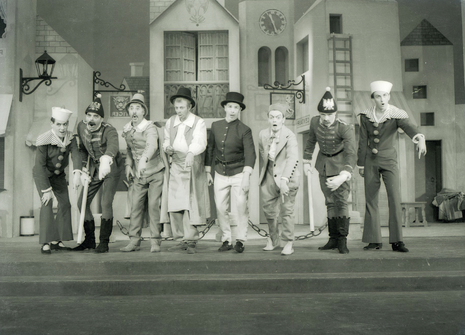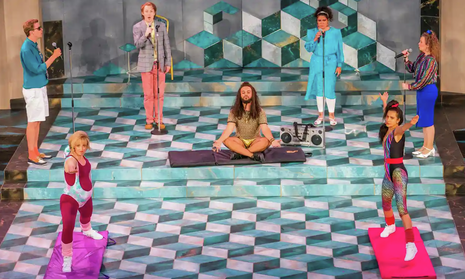“The Comedy of Errors just lends itself to a festival”
Directors Thea Melton and Milly Yelf talk collaborating on Shakespeare, and advice for newcomers to the Cambridge stage

September becomes October and Cambridge Theatre returns. One of the first offerings is The Comedy of Errors, Christ College’s May Week Shakespeare play. Ahead of opening night, I sat down with its directors, Thea Melton and Milly Yelf.
The Comedy of Errors is an early Shakespeare play, somewhere between Twelfth Night and Much Ado About Nothing. The plot goes something like this: there are two sets of twins who’ve been separated at birth. Over the course of the play they cross paths with people in each other’s lives as they roam the city of Ephesus. Mistaken identity ensues, of course with the usual resulting brawls, seduction, and theft. To add to the characters’ (and audience’s) confusion, the twins have the same names: a pair of Antipholus and a pair of Dromios. Shakespeare, helpfully, doesn’t distinguish between the two in his original text. Following? I’m not sure I am. That’s the point – Shakespeare intended Errors to be a both a chaotic mediation on cosmic forces, convenience, and self-identity, and a raucous, bewildering comedy.
Thea admits she’d never come across Errors before becoming its director but thinks it’s the best Shakespeare play for the moment. “After COVID, no one wants to see a depressing play – Errors is fun, it’s got very chaotic energy”. Milly agrees: “We weren’t going to do a history play”. This gives you a sense of the collaboration behind the direction – while Thea has a background in acting, with several Cambridge productions under her belt, she’s never directed Shakespeare before. Newcomer Milly compliments this with her knowledge of the bard drawn from her English degree. The easy banter between them suggests that the production was a lot of fun to direct. “People kept asking me how you pronounce this, and I’d say, Milly’s the one who does English!” Thea laughs.
“After COVID, no one wants to see a depressing play – Errors is fun, it’s got very chaotic energy”
One of the first challenges for the production was choosing the setting. They both agreed that a 16th century set would look unrealistic on a budget. It was also going to have to be outdoors and, given the play takes place in real time, more interesting than a garden. When they assessed the mayhem at the heart of the play, the answer became obvious. “What’s the most chaotic place in the modern day? Errors just lends itself to a festival” Milly says. With that decision made, everything else fell into place: the drunkenness of the characters, the costumes, searching for your lost friend. While Errors has sometimes been staged as a farce in the literal definition – see the RSC’s recent production – Thea and Milly purposefully leant more into the comedy than the tragedy. Milly describes how the physical comedy of the play is universal – “you just get it if someone slaps someone with an inflatable palm tree”.

Characterisation came up a lot in our conversation, an interesting focus given that Errors originally focused more on plot than character. To a certain extent this is a result of meeting over Zoom. Voice and backstory came up a lot. Thea describes how “one of the Dromio’s messaged me about dialect, they’re from Yorkshire and asked me about transitioning to an RP accent”. The cast has yet to rehearse in person, something Milly wants to lean into: “it might not end up being very tightly choreographed if the characters are drunk”. Yet a focus on characterisation also indicates a move beyond a traditional staging of Errors. While Shakespeare scholars such as Emma Smith have stressed the similarities between the twins in Thea and Milly’s play, each character is their own. In this vein, Thea and Milly broke from tradition and cast the twins as different actors. “There was initially the question of how you make these actors dress and act the same, but we found that letting the actors explore the characters gave them a depth”.
“I wouldn’t want to do directing on my own but co-directing’s great!”
The Comedy of Errors arrives at a perennial inflection point in Cambridge Theatre. The next few weeks will see freshers – and returning students like Milly – becoming involved with the Theatre scene for the first time. In terms of advice, Thea says “don’t have hesitations in applying. I was nervous to get involved as a fresher when everything was online, but I’ve loved getting to meet such a wide group of people”. Milly had “always wanted to stick [her] neck out” but hadn’t got round to it until her second year. “I wouldn’t want to do directing on my own but co-directing’s great”.
What do they want an audience to take away from watching Errors? “Honestly, to have a good time”, Thea says, ‘being immersed in chaotic energy and seeing a Shakespeare play they haven’t seen before’. Milly agrees; “When The Comedy of Errors was first performed the audience wasn’t static, they’d throw stuff on stage and heckle. I hope the audience just have fun and its less like we’re all sitting down and being quiet!“.
The Comedy of Errors will be performed at Christ’s Fellows Garden on Saturday 9th October.
 News / Judge Business School advisor resigns over Epstein and Andrew links18 February 2026
News / Judge Business School advisor resigns over Epstein and Andrew links18 February 2026 News / Hundreds of Cambridge academics demand vote on fate of vet course20 February 2026
News / Hundreds of Cambridge academics demand vote on fate of vet course20 February 2026 News / Petition demands University reverse decision on vegan menu20 February 2026
News / Petition demands University reverse decision on vegan menu20 February 2026 News / CUCA members attend Reform rally in London20 February 2026
News / CUCA members attend Reform rally in London20 February 2026 News / Gov grants £36m to Cambridge supercomputer17 February 2026
News / Gov grants £36m to Cambridge supercomputer17 February 2026










